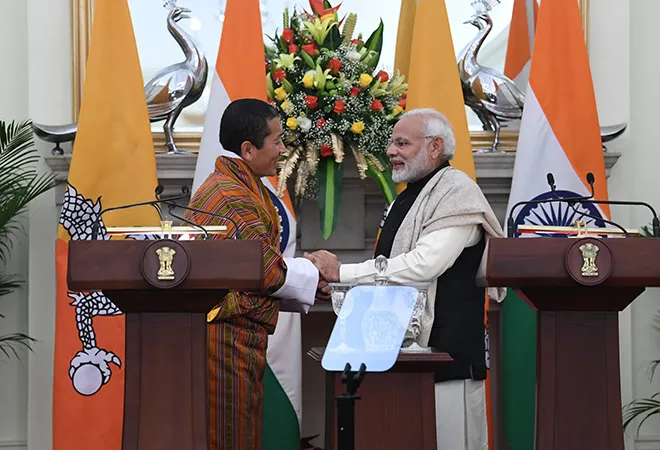It is incumbent upon India to ensure that all possible assistance is being extended to the Bhutanese people.

It is incumbent upon India to ensure that all possible assistance is being extended to the Bhutanese people, in order to keep the bilateral relationship strong, said Col. V. Shankar (retd.) at an interaction Chennai.
Although the Indian Council for Cultural Relations (ICCR) is active in Bhutan and extends a lot of scholarships to Bhutanese students to study in India, their number needs to be doubled, remarked Col. V. Shankar (retd.).
Speaking at an interaction titled India-Bhutan Relations held at Observer Research Foundation, Chennai, on 14 September 2019, Shankar said that Bhutan is what it is today because of India’s continued support. “Land-locked countries like Bhutan have to depend on their neighbours like India,” he explained.
In Dzongkha, the official language, “Bhutan meant ‘Land of the Thunder Dragon’, said Shankar. Earlier, it was called ‘land of Cyprus trees.’ To the north of Bhutan lies China, to the east the Indian State of Arunachal Pradesh and China, to the West it is Sikkim and the Chumbi Valley of Tibet, and Assam and West Bengal in the South. The population of Bhutan is around 7.8 lakhs,” said Shankar.
As the speaker pointed out, music in Bhutan derived its influence from Tibet. “Culturally Bhutan is influenced by Southeast Asia. Korean music is also very popular there. Besides, more and more Bhutanese are going to Bangkok to study medicine. The young population is getting influenced by the media,” he noted.
Shankar said that Bhutan was a Buddhist country and that H.M. Jigme Dorji Wangchuck came from Tibet and established Buddhism. “It is now the major religion in Bhutan,” he said. In Bhutan, there are two different sects of Buddhism, namely Tibetan and Bhutanese. “The followers of Bhutanese Buddhism respect His Holiness Dalai Lama even though they may not follow him. There is no hate against His Holiness,” remarked Shankar.
He also stated that Ladakhi Buddhism was similar to Bhutanese Buddhism. “Lot of Ladakhis are traveling to Bhutan, paving the way for increased interaction between Ladakh and Bhutan,” Shankar noted.
Gross National Happiness
“The concept of Gross National Happiness (GNH) was brought about by the rulers of Bhutan. One of the ways of achieving happiness was to enable transfer of power to the people. Roots of democracy began from here,” said Shankar.
“The founding father of Bhutan, His Majesty Jigme Dorji Wangchuck, expressed that citizens should be happy, for His Majesty to be happy as well. But how can happiness be measured? It means different things for different people,” Shankar said. “For some, getting into Yale means happiness, for others, something else,” he said.
Hence there was a necessity to frame standard parameters for measurement of happiness. “In this regard, food, education, health, and spirituality, were formed as the four pillars for determining the happiness quotient,” he remarked. Bhutan supports free education for all its citizens.
However, Bhutan doesn’t figure in the list of ‘top 10 happiest countries in the world’. “Scandinavian countries are at the top. The Bhutanese live for the day, they are not concerned about the past or future,” said Shankar.
Political culture
The former King of Bhutan, Jigme Singye Wangchuck, abdicated the throne in 2006, in favour of his son, Jigme Khesar Namgyel Wangchuck. The year 2008 marked 100 years of monarchy in Bhutan. Presently, the Wangchuck dynasty enjoys kingship in Bhutan.
The incumbent government is the third government since democracy came into being in Bhutan. They have a two-party system which fights the elections. Bhutan has two houses of Parliament namely, the National Assembly (comprising 47 members representing 20 districts) and the National Council (similar to Rajya Sabha in India, comprising 25 members, one from each Dzongkhag or district), he said.
“Lotay Tshering, the current Prime Minister of Bhutan and a doctor by profession, practises during the weekends. He studied in Bangladesh and India, and is a very close friend of ours,” Shankar noted.
Bilateral dynamics
Shankar pointed out that then Indian Prime Minister Jawaharlal Nehru undertook a trip to Bhutan in 1958. “This led to establishment of diplomatic relations in the same year. We celebrated 50 years of our diplomatic relations in 2018,” he said.
Prime Minister Modi recently visited Bhutan in the early stages of his second-term. “During his first-term, the very first foreign visit he made was to Bhutan, as part of the Neighbourhood First policy. Prime Minister Tshering too made India his first foreign call after being elected so,” he noted.
Shankar also remarked that India had always supported the economic affairs of Bhutan and extended assistance to Bhutanese students wanting to study in India. “Till 2007, Bhutan had diplomatic relations with only two countries, Bangladesh and India. After 2007, Bhutan established diplomatic relations with more than 20 countries. They don’t have diplomatic ties with China, as they are a very strong friend of India and believe in respecting India’s interests strongly,” he stated.
On the Bangladesh, Bhutan, India and Nepal (BBIN) initiative, Shankar said that initially it was agreed to by Bhutan, but later they had to back off after protests from within. “The people in Bhutan felt that a small country like theirs cannot handle a number of Indian vehicles,” he averred.
On the ‘Dokhlam issue’ involving India and China, Shankar noted that it was important for China because it strengthened her weakest point and threatened India’s weakest point. “When India was under British rule, a pact was signed between Tibet and British India about where the tri-junction was. Bhutan was never consulted on this. While India considers Batang La as the tri-junction, there are differences with China on this,” stated Shankar.
This report is prepared by Arjun Sundar, Research Associate — ORF Chennai.
The views expressed above belong to the author(s). ORF research and analyses now available on Telegram! Click here to access our curated content — blogs, longforms and interviews.




 PREV
PREV

